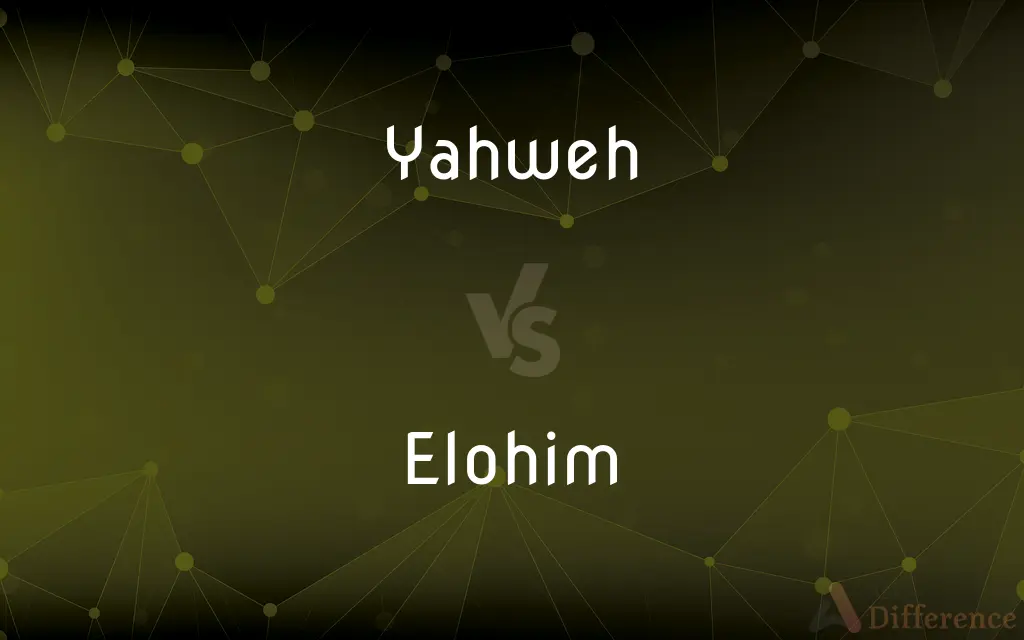Yahweh vs. Elohim — What's the Difference?
Edited by Tayyaba Rehman — By Fiza Rafique — Updated on March 17, 2024
Yahweh is a personal name of God in the Hebrew Bible, implying a covenant relationship with Israel, whereas Elohim is a more generic term for God or gods, used in various contexts.

Difference Between Yahweh and Elohim
Table of Contents
ADVERTISEMENT
Key Differences
Yahweh is considered the most sacred name for God in the Hebrew Bible, representing the God of Israel who is personal, covenantal, and relational. It signifies God's self-revelation to Moses in the burning bush and His unique relationship with the Israelites. Elohim, on the other hand, is a plural noun in Hebrew that can refer to gods in general or the God of Israel, depending on the context. It's used in the Bible to denote the creator of the world and is a title that emphasizes God's power and sovereignty.
While Yahweh is used exclusively to refer to the God of Israel, highlighting His personal interaction and covenant with His people, Elohim can be used in a broader sense for any deity or deities in ancient Near Eastern contexts, including the God of Israel. This distinction underscores Yahweh's unique covenantal role and relationship with the Israelites, as opposed to the more general and sovereign aspect of God depicted by Elohim.
The name Yahweh is often considered too sacred to vocalize by Jews, and it is substituted with Adonai or HaShem (The Name) during reading or prayer, reflecting its profound sanctity and significance. Elohim, while also respectful and reverent, does not carry the same level of personal and covenantal intimacy, and is thus more frequently used in scripture and speech.
In theological discussions and biblical interpretation, the use of Yahweh emphasizes God's immanence—His presence and involvement in the world and with His people. Elohim, by contrast, often highlights God's transcendence, His power, and majesty above and beyond creation. This contrast offers a comprehensive view of God's nature as both imminently close to humanity and transcendentally above all.
The different contexts and uses of Yahweh and Elohim in the Hebrew Bible reflect the rich tapestry of the language and theology of ancient Israel. While Yahweh denotes a specific, covenantal relationship with a particular people, Elohim serves to remind readers of God's sovereignty, creative power, and authority over all the earth, including His role as the judge of all.
ADVERTISEMENT
Comparison Chart
Definition
Personal name of God, emphasizing a covenant relationship.
Generic term for God or gods, denoting power and sovereignty.
Usage
Exclusive to the God of Israel.
Broad, can refer to God of Israel or other deities.
Connotation
Covenant, intimacy, personal relationship with Israel.
Sovereignty, creative power, universality.
Sacredness
Considered too sacred to vocalize, substituted in speech.
Used more freely, without substitutions in normal contexts.
Theological
Immanence - God's presence and involvement with His people.
Transcendence - God's supreme power and authority.
Representation
Revealed to Moses, associated with liberation of Israel.
Creator of the world, judge of humanity.
Compare with Definitions
Yahweh
Signifies the covenant between God and Israel.
Yahweh delivered Israel from Egypt as part of His covenant.
Elohim
Can refer to the God of Israel or other deities.
Elohim created the heavens and the earth in Genesis.
Yahweh
Highlights God's close presence to His people.
Yahweh's guidance through the wilderness showed His nearness.
Elohim
Emphasizes God's power as the creator.
Elohim's act of creation demonstrates His sovereignty.
Yahweh
Represents God's unique relationship with Israel.
Yahweh appeared to Moses in the burning bush.
Elohim
Suggests God's rule over all peoples, not just Israel.
Elohim's laws are for the welfare of all humanity.
Yahweh
Associated with Israel's liberation and receiving the Law.
Yahweh gave the Ten Commandments to Israel.
Elohim
Not restricted to the covenant people of Israel.
Elohim is used when referring to gods of other nations.
Yahweh
So sacred that it's often not spoken aloud.
Jews use Adonai instead of Yahweh during prayer.
Elohim
Reflects God's majesty and authority over creation.
Elohim judged the world during the flood.
Yahweh
Yahweh was the national god of Ancient Israel. His origins reach at least to the early Iron Age and likely to the Late Bronze Age.
Elohim
In the Hebrew Bible, elohim (Hebrew: אֱלֹהִים [(ʔ)eloˈ(h)im]) usually refers to a single deity, particularly (but not always) the God of Israel. At other times it refers to deities in the plural.The word is the plural form of the word eloah and related to el.
Yahweh
A name for God thought to represent the original pronunciation of the Tetragrammaton among the ancient Hebrews.
Elohim
A name for God in the Hebrew Scriptures.
Yahweh
A modern transliteration of the Hebrew word translated Jehovah in the Bible; - used by some critics to discriminate the tribal god of the ancient Hebrews from the Christian Jehovah. Yahweh or Yahwe is the spelling now generally adopted by scholars.
Elohim
One of the principal names by which God is designated in the Hebrew Scriptures.
Yahweh
A name for the God of the Old Testament as transliterated from the Hebrew consonants YHVH
Common Curiosities
Can Yahweh and Elohim be used interchangeably?
While both can refer to the God of Israel, their usage emphasizes different aspects of God's character and relationship with humanity.
Why is Yahweh considered sacred?
Yahweh is considered sacred due to its association with God's self-revelation and covenant with Israel, symbolizing a deep, personal relationship.
Are there biblical texts where Yahweh and Elohim are used together?
Yes, there are passages where both names are used, blending the themes of covenant, sovereignty, and creation, to provide a fuller picture of God's nature.
What does Yahweh mean?
Yahweh is the personal, covenantal name of God in the Hebrew Bible, associated with His intimate relationship with the people of Israel.
Why is Elohim plural?
Elohim is plural to denote majesty or sovereignty, reflecting the ancient Near Eastern context where deities were often referred to in the plural for honorific purposes.
Does Elohim only refer to the God of Israel?
While Elohim primarily refers to the God of Israel in the Hebrew Bible, it can also refer to other gods or divine beings in different contexts.
What theological significance does the use of Yahweh have?
The use of Yahweh emphasizes God's immanence and personal involvement in the lives of His people, as well as His commitment to the covenant.
How do Jews today refer to Yahweh?
Due to its sacredness, Jews commonly refer to Yahweh as Adonai (Lord) or HaShem (The Name) in prayer and speech.
How does Elohim highlight God's nature?
Elohim underscores God's transcendence, creative power, and sovereignty over the entire universe, not limited to a covenantal relationship.
What impact does the distinction between Yahweh and Elohim have on biblical interpretation?
Understanding the distinction can deepen insight into the different dimensions of God's relationship with the world and His chosen people, affecting theological and exegetical perspectives.
Share Your Discovery

Previous Comparison
Bisector vs. Diagonal
Next Comparison
Detour vs. DivertAuthor Spotlight
Written by
Fiza RafiqueFiza Rafique is a skilled content writer at AskDifference.com, where she meticulously refines and enhances written pieces. Drawing from her vast editorial expertise, Fiza ensures clarity, accuracy, and precision in every article. Passionate about language, she continually seeks to elevate the quality of content for readers worldwide.
Edited by
Tayyaba RehmanTayyaba Rehman is a distinguished writer, currently serving as a primary contributor to askdifference.com. As a researcher in semantics and etymology, Tayyaba's passion for the complexity of languages and their distinctions has found a perfect home on the platform. Tayyaba delves into the intricacies of language, distinguishing between commonly confused words and phrases, thereby providing clarity for readers worldwide.















































